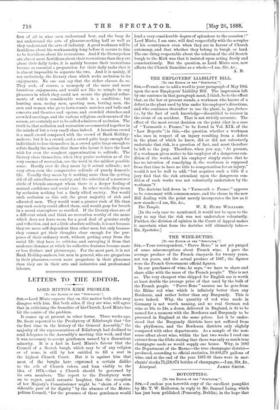THE EMPLOYERS' LIABILITY BILL.
(To THE EDITOR OF THE " SPECTATOR."] SIR,—Permit me to add a word to your paragraph of May 19th upon the new Employers' Liability Bill. The impression left by one sentence in that paragraph must, I think, be to the effect that, as the law at present stands, a workman who knows of a defect in the plant used by him under his employer's directions, and who continues thereafter to use the plant, is, ipso facto- i.e., by the fact of such knowledge—disentitled to recover in the event of an accident. That is not strictly accurate. The effect of the most recent decision on the point (that in a case of " Yarmouth v. France," to be found in Vol. XIX. of the " Law Reports ") is this,—the question whether a workman who sues in respect of an injury resulting from a defect in the plant of which he knew, did or did not voluntarily undertake that risk, is a question of fact, and must therefore be left to the jury. Therefore, when you say, " At present, if a workman gives notice to his employer of a dangerous con- dition of the works, and his employer simply states that he has no intention of remedying it, the workman is supposed from that time to have no title to compensation for an injury," would it not be well to add, " but acquires such a title if a jury find that the risk attendant upon the dangerous con- dition of such works was not voluntarily undertaken by the workman"?
The doctrine laid down in " Yarmouth v. France " appears to be consonant with common-sense, and the clause in the new Bill dealing with the point merely incorporates the law as it now stands.—I am, Sir, &c.,
[In the only case we mentioned, it would not be open to the jury to say that the risk was not undertaken voluntarily. Further, the division of opinion in the Court of Appeal makes it uncertain what form the doctrine will ultimately take.— ED. Spectator.]


































 Previous page
Previous page